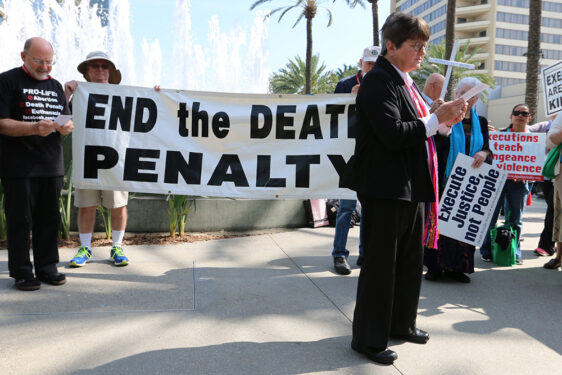
WASHINGTON — Democratic lawmakers announced a bill July 13, supported by dozens of Catholic groups, to end the federal death penalty.
The Federal Death Penalty Prohibition Act, introduced twice before, was reintroduced by Rep. Ayanna Pressley, D-Massachusetts, and Sen. Dick Durbin, D-Illinois. The legislation would prohibit death sentences for any violation of federal law and require resentencing for those already on federal death row.
“The death penalty is a failed, unjust policy — and it’s time to prohibit the deeply flawed practice once and for all,” Durbin said in a July 13 tweet.
Pressley, in a statement, said: “State-sanctioned murder is not justice, and it’s time we abolish the cruel, racist, and fundamentally flawed death penalty that has been weaponized against black, brown, and low-income people for far too long.
“With momentum growing across the country, Congress must follow suit and pass our bill to end the federal death penalty once and for all,” she added.
Durbin, who is chair of the Senate Judiciary Committee, said the death penalty is “disproportionately imposed on black and brown and low-income people in America,” and emphasized that this bill “follows the lead of 23 states, including Illinois, by finally putting an end to this failed and unjust policy at the federal level.”
The two lawmakers first introduced this bill to Congress in 2019, after then-Attorney General Bill Barr announced that federal executions would resume for the first time in 16 years. They reintroduced it again in 2021 after the Trump administration carried out 13 executions.
The Biden administration placed a moratorium on carrying out federal death sentences while the Department of Justice reviewed execution procedures.
Durbin’s office released a list of more than 400 groups supporting this legislation that included dozens of women’s religious orders, several Pax Christi chapters, the Franciscan Action Network, Ignatian Solidarity Network, Maryknoll Office for Global Concerns, Jesuit Conference Office of Justice and Ecology, Catholic Worker communities, the Indiana Catholic Conference, Sister Helen Prejean’s Ministry Against the Death Penalty, and Catholic Mobilizing Network.
Krisanne Vaillancourt Murphy, executive director of the Catholic Mobilizing Network, a group that promotes ending capital punishment in the U.S., said in a July 13 statement, that she applauds the proposed legislation “which would eradicate the flawed and morally bankrupt federal death penalty system.
“As Catholics who believe in the inviolability of human dignity, we understand that we cannot build a culture of life with a federal government that can put people to death. This legislation opens up the possibility for more healing and life-affirming forms of justice,” she said.
Vaillancourt Murphy also noted that when the federal death penalty was reinstituted by the Trump administration after its hiatus, the government disregarded “ample evidence that the federal death penalty system is racially biased, arbitrary, and fraught with errors. This shocking backslide into executions tarnished any claim the administration made to be ‘pro-life.’ ”
She also noted that there is “little doubt that capital punishment will one day be abolished in the United States, but time is of the essence. As long as executions are legal, human lives are on the line. It’s time for Congress to exert the political will and moral courage needed to abolish the federal death penalty once and for all.”
